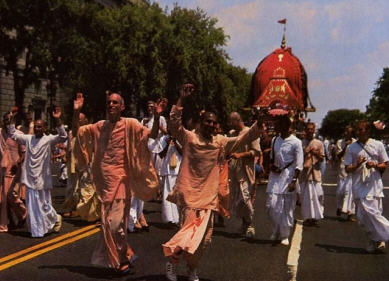A look at the worldwide activities of the
International Society for Krishna Consciousness (ISKCON)
Jagannatha Wins in U.S. Independence Day Parade

Washington D.C. An estimated eighty thousand people lining Constitution Avenue here on July 4 for the U.S. Independence Day parade were blessed with the auspicious sight of Lord Jagannatha, Lord Balarama, and Lady Subhadra riding on their brilliant chariot pulled by devotees enthusiastically chanting the Lord's holy names and dancing. The transcendental spectacle so impressed the judges that they awarded the devotees a plaque for the best float in the parade, which included 105 entries.
The annual parade is seen by visitors from around the world. At least 125 devotees participated and appeared on television nationwide. Next year devotees will hold a festival after the parade, on the National Mall, where half a million people gather each year for U.S. Independence Day celebrations.
Devotee Brings Krsna To the Elderly
Murwillumbah, Australia Satananda-devi dasi, a member of the New Govardhana farm community here and a part-time nurse at a Gold Coast old persons' home, has influenced many of the staff and residents of the home to accept the practices of Krsna consciousness. Many of the residents now wear neck beads, regularly chant the Hare Krsna mantra on beads, and wait anxiously for Satananda dasi to arrive with Deity garlands and milk sweets. At least one woman died with her neck beads on and clutching her chanting beads.
The residents of the home also like to read about Krsna consciousness. A visitor to the home will find Back to Godhead magazines in the magazine rack and Srila Prabhupada's books on shelves and lying around on chairs and tables, where they have been left temporarily, to again be taken up after a nap or a meal.
Satananda dasi has even persuaded the management to introduce a selected vegetarian diet to all residents, using recipes from cookbooks of the Krsna consciousness movement. It wasn't easy, because she had to win the support of both the management and the staff. The kitchen staff had to be educated in the art of vegetarian cooking.
The head matron at the home and many of the staff members have visited New Govardhana for Sunday Feasts and have spent a pleasant day at the farm and at Satananda's home. Some of them have become vegetarians and are becoming more and more interested in Krsna consciousness.
A group of residents organised a tour of New Govardhana and returned to the home expounding the virtues of the farm and the devotees, no doubt influencing others to appreciate Krsna consciousness. Many of them are in their nineties and will die with fond memories of Krsna.
Soviet Devotees Not Free Yet
Almviks Gard, Sweden Despite official Soviet recognition of Krsna consciousness as a state-approved religion, the Committee to Free Soviet Hare Krishnas (CFSHK) is still concerned about the precarious situation of ISKCON members in the Soviet Union. A CFSHK spokesman has described the registration as a mixed blessing that came only after the Soviet government had failed to curtail the Krsna consciousness movement by other means.
The Moscow Society for Krishna consciousness was officially founded on June 20, but that doesn't mean the persecution is necessarily over for the Soviet devotees. "Registration actually means control," the CFSHK spokesman said. "Registered religions are always under the heavy scrutiny of the Council for Religious Affairs, and if a recognised religion violates the terms of registration, there is the ever-looming chance that registration can be revoked."
In a press release dated June 20, Soviet emigre Vedavyasa dasa, who spent time in a Soviet psychiatric hospital for his involvement with the Krsna consciousness movement, noted that "actual freedom of religion freedom to preach in public, print and distribute religious literatures in big quantities, travel outside the USSR for religious education and pilgrimage these and so many other things are yet required for the Hare Krsna followers in the Soviet Union."
Six devotees in the Soviet Union are still prisoners of conscience one in prison, one in a labour camp, and four under compulsory labour.
The imprisoned devotee, Vrndavana dasa (Vladimir Kustrya), is ill because of poor conditions and mistreatment suffered while serving less than two years of a five-year labour-camp sentence. When Vrndavana's legs became swollen, making it difficult for him to walk, he refused to perform his work of cutting wood. Because of his "disobedient behaviour," he was transferred on March 25 from his labour camp in Kirovskaya Territory to a maximum security prison in Ulyanovskaya Territory, where conditions are worse. He may send one letter every two months and receive one parcel every six months.
Amala-bhakta dasa (Yeygeny Lyubinsky) has served one and a half years of a four-year sentence in a labour camp and suffers from tuberculosis. His case was brought to the attention of President and Mrs. Reagan when his wife, Svetlana, and their three children were invited to attend a reception during the Moscow summit talks at the end of May.
The CFSHK expresses guarded optimism for the future. A spokesman described a recent meeting between Soviet General Secretary Mikhail Gorbachev and Patriarch Pimen, head of the Russian Orthodox Church. "During this meeting Gorbachev talked about religious freedom in the Soviet Union and how it must be respected. We are hopeful that with Gorbachev in charge, things will continue in a progressive manner," the spokesman said.
